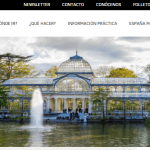The experts attending the “Tourism Intelligence and Data Forum, keys to sustainability”, held in Benidorm, agree that data allows destinations and tourism companies to make knowledge-based informed decisions, prepare for what is next and improve the customer experience.
The forum, which brought together more than 250 tourism professionals was organised by the Secretary of State for Tourism in collaboration with the European Commission as one of the events held under the Spanish Presidency of the Council of the European Union.
The forum was opened by the Chairman of SEGITTUR, Enrique Martínez; the regional secretary for Tourism of the Region of Valencia, Cristina Moreno; the assistant deputy director general for DG Grow (Internal Market, Industry, Entrepreneurship and SMEs) at the European Commission, Huber Gambs; and the mayor of Benidorm, Toni Pérez.
The Chairman of SEGITTUR, Enrique Martínez, took the opportunity to highlight the importance that data has acquired in decision-making, although he also stressed the need to understand the purpose for which data is acquired and analysed.
Destinations such as Benidorm and the Basque Country have agreed that tourism intelligence systems help optimise the decision making process, based on the behavior of the tourist throughout the life cycle of their stay, although the granularity of data must be enhanced to generate more exhaustive information.
In turn, the executive director of the World Tourism Organization, Natalia Bayona, stressed that data is at the centre of technologies in tourism, while encouraging Europe not only to be leaders in tourism, but also leaders in tourism technology, helping to promote the digitalisation of SMEs and data training.
Understanding the preferences of tourists
At the event, the European data space project DATES, led by Anysolution, and Tourism Data Space project, led by the Spanish company Forwardkeys, were presented; their aims are to enhance efficiency and cost savings, increase efficiency, streamline processes and access a higher volume and quality of data.
When it comes to understanding the tourist through data analysis, companies such as Visa, Civitatis and NH believe that this information helps us to understand where the tourist moves, how they act in the destination and what their preferences are, allowing the destination to improve its planning and companies to redirect their offer in response to the information obtained.
They were all convinced that data spaces must be led by the public sphere, although shared value must be created between the public and private spheres, always prioritising data that contributes to achieving more sustainable tourism.





